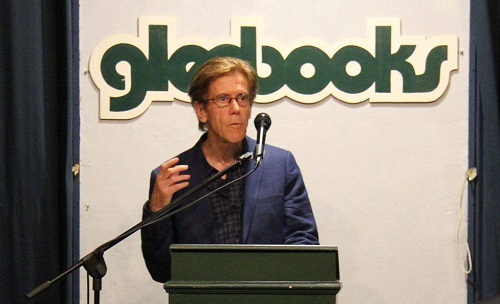De Australische dichter Robert Gray werd geboren op 23 februari 1945 in Port Macquarie. Zie ook alle tags voor Robert Gray op dit blog.
Life of a Chinese Poet
In his youth, as he recalled, the Great Causeway of the Heavens
and Earth trembled
and the stars were spilled like dust, at the overthrow of a dynasty.
It could seem that he was old from birth, who was always saying
goodbye.
During eighty years he wrote five thousand poems, in a rhyming
prose or as songs for the lute.
Otherwise, his life was uneventful, except for the always-
remembered love that he had for a certain courtesan.
His mother refused to let him marry this girl, who was called
Scented Jade,
and soon afterwards he was ordered as a minor clerk to the far
province of Fukien.
There he discovered, at times, the consolation of nature — its
vividness, and its unthinkable reality.
He writes of the wild mountains, that were as sharp and glittering
as dogs’ teeth,
and that could be seen from among the hanging flowers of the
white lanes.
The river there he also admired, which he says was like the great
dragon of Ch’i
that turned upon itself in all the twelve directions, while subduing
the five elements.
It was his dream from youth to take arms against the Golden Tartars,
but the northern frontiers had been made safe; there was no
fighting, but only an endless boredom there.
At fifty-four, he went home to his native village, having never
gained a preferment,
distressed by what he heard of the luxury and incontinence of the
court.
He dreamed in his work of the “vast smoke” of chariots, as they
raced upon the plains;
he described his travels to far outposts, by night on a river that was
held in the moon’s white stare.
Though he styled himself the Hermit of the Mossy Grove, and said
that he was wild, irascible and drunken, it seems he longed for
the company of other poets.
He had married a local girl, when she was fifteen, and spent most
of his time quietly lost in his books.
Pondering both the Taoist and Ch’an Buddhist teachings, he grew
more and more enamored of nature,
and found his companionship in mountains, rivers, and trees.
In rainy weather he would put aside his studies and trudge to the
inn, to drink with the farming hands.
“Daily the town inn sells a thousand gallons of wine. The people
are happy; why should I alone be sad?”
He was utterly sincere in his love of beauty. The thing he has seen
appears on the white paper. There is a sense of overbrimming life.
A Chinese critic has said, “His poetry has the simplicity of daily
speech; in its simplicity there is depth, and in its poignance
there is tranquility.”
When he was seventy-one, the Mongols arose once more, and
began to attack the Celestial Horde;
the armies of the Sung were continually defeated, and were even
driven out of Szechuan.
Again, he applied for enlistment, but amidst the turmoil in the
corridors at the provincial capital he was pushed aside and
ignored.
Giving up all hope that before he died he would see himself in
battle, he returned to his village in disgust.
His songs were now being sung by the muleteers in far mountain
passes, by girls bringing silk to be washed in the streams.
In the capital, they were exclaimed over at wine parties, and were
murmured beside the Imperial Lake.
He was revered, if rarely seen, in his village, but finally one morning
the word went around that he had fallen hopelessly ill.
Everything was made ready — the thin coffin, the two thick quilts,
and the payment for the monks;
the earth was thrown out of his grave onto the hillside, and
the incense was bought that would smoulder among the
graveposts there.
But then, the next day, he rose on his couch, and called for wine to
be brought him from the marketplace;
he had the blind rolled up on his view to the south, and he wrote
some impeccable verses, in the tonally-regular, seven-syllable
form.
EEN SCHAAL MET PEREN
Roetig als wasdoek en gezet
als Sancho Panza
voorzien van het steeltje van een baret
vraagt de peer
zelf om een doortastende benadering
het fijnste lemmet
uit de messenlade
hier
hem op te fleuren is een snee en dan nog een
de noordwand de zuidwand
gletsjerfacetten
het zoet knerpen van zijn sneeuwschone sappen
Ik vind glad gevoegde dorpels
en plinten van wit marmer
waar het bolletje parfum
langs drupt
een frisheid
als de bries die je voelt wanneer
de waaier van de dag
zich opent
Enku verwoede
beeldhouwer van dennestompen
onthulde de tienduizend boeddha’s
met kalligrafisch geweld
Gerationaliseerde vorm gevormd
met verticale japen
heb ik je weelderige bips tot bekken
teruggebracht
Een zondag regen
en als een tjokvolle gargouille
die te lang had gezwegen ketst en kaatst
de donder lenig
bazelt door een omgekeerde trechter
de hele middag boven de daken
zijn boodschap
van burleske strijdlust
Losgeraakte
regenveters bungelen
langs de ramen
nu scherpt
een slager het licht
wettend
zijn lievelingsmes
snijdt flikkerende strepen in de tuin
En ik sneed het peervormige hoofd
met dicht bijeenstaande
ogen als pitten
dat Picasso zag zijn arme
vriend die naar het front
was opgeroepen
een cubistische sneeuwpop de zoet-
gevooisde gedoemde Apollinaire
Vertaald door Maarten Elzinga

Zie voor nog meer schrijvers van de 23e februari ook mijn blog van 23 februari 2022 en ook mijn blog van 23 februari 2019 deel 1 en eveneens deel 2.
